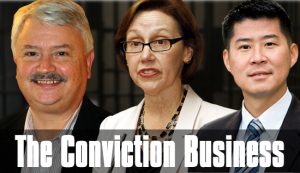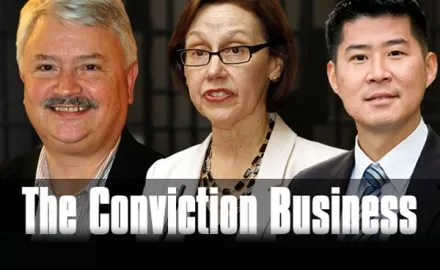Verdict is Proof Oregon Judge McHill Originally Helped Convict an Innocent Randy Gray
By US~Observer Staff
Linn County, OR – Theft by deception is a weighty charge. It accuses a person of obtaining the property of another with the intent to defraud by creating, confirming, or failing to correct another’s false impression of law or value that the person does not believe to be true. Lies are potent, especially when eventually, the liar is found out, as in the malicious and unethical prosecution of Randy Gray.
In January 2014, Judge Thomas McHill, of the Circuit Court of Linn County presided over the case of State of Oregon v. Randy Gray. The defendant was charged in August 2011 for transactions conducted in 2008 involving one count of racketeering involving securities fraud and selling of unregistered securities, to wit: an investment contract, sixteen counts of selling unregistered securities, and sixteen counts of aggravated theft (by deception).
Assistant District Attorneys General Daniel Wendel and Simon Whang prosecuted the case, and after the State rested their case, the judge granted a motion for judgment of acquittal on one count of racketeering and sixteen counts of selling unregistered securities. This changed the entire tenor of the case to defending the aggregated theft charges. Unfortunately, the jury did not follow the court’s instructions and answered ‘yes’ to questions about enhancement facts and not the elements of the crime. This led to Gray being found guilty of sixteen counts of aggravated theft by deception in the first degree.
At the sentencing hearing, the defense motioned for a new trial (which was denied) based on irregularities in the first trial. The defense motioned for a new trial (which was denied) based on two jurors submitting letters explaining the elements of the crime were not met. The defense filed a motion for a stay of sentence pending appeal (which was denied) but later the conviction would be overturned by the Appeals Court. Mr. Gray was immediately incarcerated for a 36-month sentence with the Oregon Department of Corrections. After five demoralizing weeks at the Coffee Creek processing center in Wilsonville, he was housed at Santiam Correctional Institute in Salem, Oregon. Five weeks later, his wife gave birth to their seventh child.
After two long years, the Office of Public Defenders argued an appeal before the Oregon Court of Appeals. Meanwhile, two additional motions for stay of sentence were filed, argued, and denied. In July 2017, three months after Mr. Gray had completed his 36-month sentence and returned home to his wife and seven children, the Oregon Court of Appeals reversed and remanded his conviction based on the fact that Judge McHill ruled in favor of the State’s motion to exclude (exculpatory) evidence. The Court of Appeals determined, “the defendant’s proffered evidence was relevant if it could support any permissible inference, however slight, that he lacked the intent to defraud or to deprive at the time of the theft … we conclude that defendant’s evidence was probative of his intent to defraud and that the court erred in ruling otherwise” (State v. Gray, 286 Or App 799, 401 P.3d 1241 (2017). The Court of Appeals decision allowed for the State to retry the case but with the evidence that after the clients’ loan was in default, Mr. Gray serviced the loan for more than two and a half years and worked to salvage the project, pointing to his state of mind at the time of the transaction.
After two additional years of motions and hearings arguing for rights pertaining to arraignment, statute of limitations, secret indictment, jurisdiction, joinder language, amending indictment, and double jeopardy based on using evidence from acquitted charges, the second trial scheduled for early 2020 was delayed due to pending decisions and eventually the pandemic shutdown. In December 2020, defense counsel Mr. James Leuenberger passed away suddenly leaving Mr. Gray scrambling to secure competent legal counsel.

In April 2021, Mr. Gray retained attorney Jason Thompson of Salem, Oregon, who dealt with the problematic indictment and acquittal of 17 counts in the first trial. Years prior, Judge McHill had denied a new trial before Mr. Gray was sent to prison because the judge agreed with prosecutor Simon Whang that theft by deception and securities fraud have the same elements. But in a September 22, 2020, ruling, Judge McHill said, “the elements of the charges concerning securities violations and theft are different and depend on evidence relevant to those specific charges.”
Next, Judge McHill denied a double jeopardy claim, claiming the State would put on evidence different than the first trial. Jason Thompson also filed a motion to dismiss (based on double jeopardy) the 16 counts of theft by deception on February 3, 2022, and was argued April 7, 2022, but Judge McHill denied the motion to dismiss based on double jeopardy as well. The inconsistency clearly maliciously harmed Mr. Gray.
In the second trial, prosecutor Wendel used verbatim the same evidence of the first trial by reading the trial transcript to prove his case in chief in the second trial. McHill should have stopped the trial after realizing the State was not presenting any evidence different from the first trial. Mr. Wendel had misled the court and McHill was supporting this vial corruption when he later denied a motion for judgment of acquittal after the State rested its case. McHill claimed Mr. Gray had a duty to disclose that the use of the clients’ funds was an element of theft. The duty to disclose is not an element of theft, and the duty to disclose was abolished when Mr. Gray was acquitted of any securities violations in the first trial. Clearly the court was using the same evidence from the first trial to convict Mr. Gray in a second trial violating his double jeopardy protections. This strategy was malicious because Judge McHill instructed counsel that evidence used in the first trial could be presented to the jury, but Mr. Gray’s defense could not include the fact that he had been acquitted of those charges. The jury was left in the dark as to why Mr. Gray was violating securities laws and not putting on a defense to the contrary.
The jury was dismissed after acquitting Mr. Gray, and surprisingly jury members came forward and contacted Mr. Gray after they learned about the acquittal of the securities charges. They were appalled to find out this information was intentionally withheld from them. The State was pulling the same stunts in the second trial that had caused the Appeals Court to reverse the first conviction.
Judge McHill and prosecutor Wendel did not have any respect for the Appeals Court ruling. They only wanted to win at any cost by withholding evidence with the hope that the jury would convict Mr. Gray a second time. The irony is that the State’s theory was Mr. Gray omitted facts as the basis for the crime of theft by deception, when omitting facts was the State’s only way of proving their case.
Jason Thompson also had to deal with the problematic two second amended indictments that the judge himself filed on July 30, 2020, and September 23, 2020, and denied Mr. Gray from being arraigned, so Gray’s attorney was unable to effectively represent him. No judge has the authority to file amended indictments, only District Attorneys! After realizing Jason Thompson had exposed their corruption during the April 7, 2022 hearing, later that day Prosecutor Wendel filed a third amended indictment, removing the courts original filing date and signature dated August 25, 2011 at 3:34 pm, removing the original bar code label on the first page of the indictment, striking out $50,000 in counts 2 through 17, adding $10,000 below each $50,000 stricken in counts 2 through 17 and inserting language from Oregon Revised Statutes 132.650 on page 17 line 12 in a manner nobody would see without extreme scrutiny.
Judge McHill authorized filing the third amended indictment because the changes were “scriveners errors”. Jason Thompson filed an eighth demurrer on April 13, 2022, realizing the indictment was filed almost 11 years past the statute of limitations. Judge McHill claimed the third amended indictment was not a new filing, when in fact it had been filed by Prosecutor Wendel on April 7, 2022, as the grounds to deny the demurrer in his opinion letter dated August 23, 2022. If the demurrer had been granted the case would have been dismissed saving the State of Oregon and Mr. Gray money, time, and stress.
With all legal arguments exhausted and denied, the second trial (called a ‘continuation of the first trial’ by the prosecution and judge even though the first trial was properly concluded and appealed) was scheduled to begin October 24, 2022.
With a new jury impaneled, the State began opening arguments by challenging the jury to “find the lie”. The State retried the first case nearly verbatim, trying to exclude any indications that this case had been previously tried, argued, decided, and acquitted. In the process of defense cross-examinations, however, attorney Jason Thompson successfully countered the State’s fictional tale − that Mr. Gray intended to dupe elderly people out of their retirement money − by weaving an alternative theory that Mr. Gray was in fact carrying out the clients’ wishes and providing an opportunity to avoid the huge stock market losses of 2008.
The State’s expert witness Jason Ambers from the Division of Financial Regulation shocked the jury by testifying that ‘all notes are securities’, implying that every citizen could be potentially guilty of dealing with unregistered securities in their everyday transactions. Jason Thompson was able to use reports and recordings given in discovery from the prosecutor that forced lead investigator, Ruth Johnson to admit under oath, she misled, misrepresented, and even withheld telling the victims the information she wrote in her reports that their land was worth as much as $3,000,000. Without this information, the lenders foreclosed on the $3.3 million dollar loan and sold the loan collateral for less than $300,000. Five years later the land sold for over $10 million dollars.
Upon the foreclosure being finalized April 12, 2013, (interestingly also executed by Judge McHill), the Judge should have never allowed a first trial to be scheduled for June 3, 2013, because the finalized foreclosure judgment determined the transaction was a mortgage loan. Jason Ambers the State’s expert witness testified during the first trial that mortgages are exempt as securities, and he did not have jurisdiction to prosecute under securities law. In the second trial, Jason Ambers changed his testimony and further misled the jury by stating all mortgages (notes) are securities, indicating the State had jurisdiction to prosecute.
The State relied heavily on the requirements of disclosure relating to someone dealing with securities transactions when in fact, the judge had determined in the first trial that the loans were not securities transactions. The jury heard far too much about disclosures and fiduciary responsibility that had no relevance to the elements of aggravated theft (by deception). Fortunately, during the day of deliberations, the jury carefully examined all the evidence, considered all the testimony, and determined that Mr. Gray had no intent to defraud or deprive the clients of their money, and they found him NOT GUILTY. The jury found the lie, and it was NOT from Mr. Gray.
Randy Gray was found not guilty on all 16 theft counts November 8, 2022, and then received the judgment of acquittal on all 33 counts November 30, 2022.
Jason Thompson filed a motion November 9, 2022, demanding the $10,000 bail money posted in 2011 be returned. It appears the motion was denied, and Judge McHill closed the file December 1, 2022. Mr. Gray received a letter five days later demanding he owes the State $2,983,092.62 due in 60 days or it may be referred to collections without further court action. Jason Thompson filed a motion for immediate return of restitution in the amount of $154,508.52 on December 9, 2022. Judge McHill granted the motion to return the restitution by signing an order dated January 3, 2023. The order was sent to the Business and Fiscal Service Division (BFSD) in Salem. David Moon, an employee of BFSD, has refused to issue payment to Mr. Gray. Jason Thompson spoke with David Moon on January 30, 2023, and suggested a contempt of court motion would be filed if payment is not made.
The demand letter was sent to Mr. Gray from BFSD because Linn County Court House notified them Mr. Gray owed restitution from his 2014 conviction. Linn County Court House posted $2,782,225.77 as restitution on November 6, 2014, based on a judgment from the first trial. Linn County Court House posted another $337,505.91 of restitution on May 5, 2015. The restitution posted in May is based on three other alleged victims that were not included in Mr. Gray’s 16 theft counts.
Linn County Court House has put judgments on Mr. Gray that have no lawful authority. Mr. Gray has contacted James Belshe, Trial Court Administrator for Linn County, and he ignored responding to Mr. Gray’s emails and phone messages. Mr. Gray finally spoke with James Belshe on February 2, 2023. James Belshe said he did not know who put the restitution amounts in the file. James Belshe said he was not going to make any changes to the account until he received a green light from BFSD.
Mr. Gray then asked why the restitution was not removed in 2018 when the appeals court reversed the judgment. James Belshe said Mr. Gray’s case was linked to the other codefendants who were on appeal so they couldn’t do anything in 2018 regarding the Appeal Court’s order. The problem with that statement is the codefendants are not on appeal and have already served out their sentences.
The Linn County Court House is making things more difficult for Mr. Gray by refusing to remove the judgment from his account and returning his $154,508. Mr. Gray cannot have his record expunged until the Linn County Court House removes the judgment showing he owes over $3,000,000 which means Mr. Gray continues to be harmed. Mr. Gray cannot own a gun, get a loan or interview for work for example, until his record is expunged. They keep telling Mr. Gray they are reviewing the information and will fix it if it is wrong. Mr. Gray might pass away by the time they get things figured out! This is another example of how the State of Oregon bullies people who stand up against them and expose their corruption, lies and willful intent to retaliate and harm innocent people.
At this juncture, Mr. Gray is seeking relief under Oregon’s new Senate bill 1584 which compensates wrongfully incarcerated persons, and he intends to continue restoring what the clients lost when the overzealous, overreaching State investigators and prosecutors interfered and mischaracterized Mr. Gray and his clients’ legal business contract.
Editor’s Note: Randy Gray should file a civil rights lawsuit immediately and hold all of the corrupted individuals who have harmed him and his family accountable. The US~Observer greatly commends Mr. Gray’s second jury for listening closely in court and for realizing the state and their witnesses were lying.
















